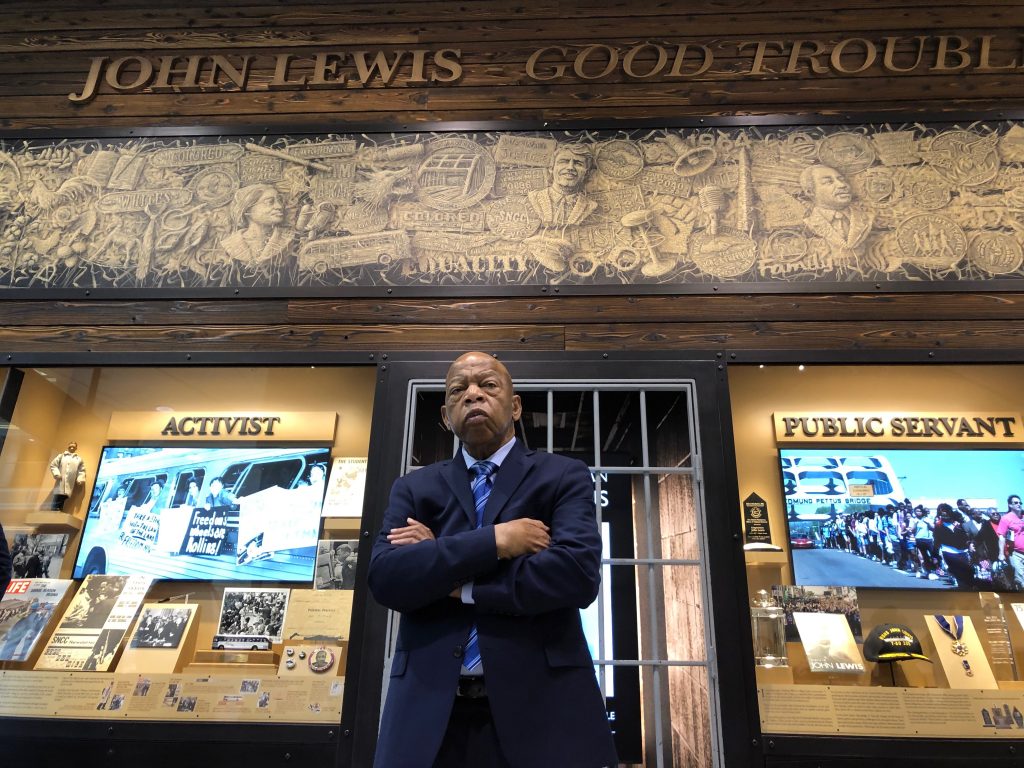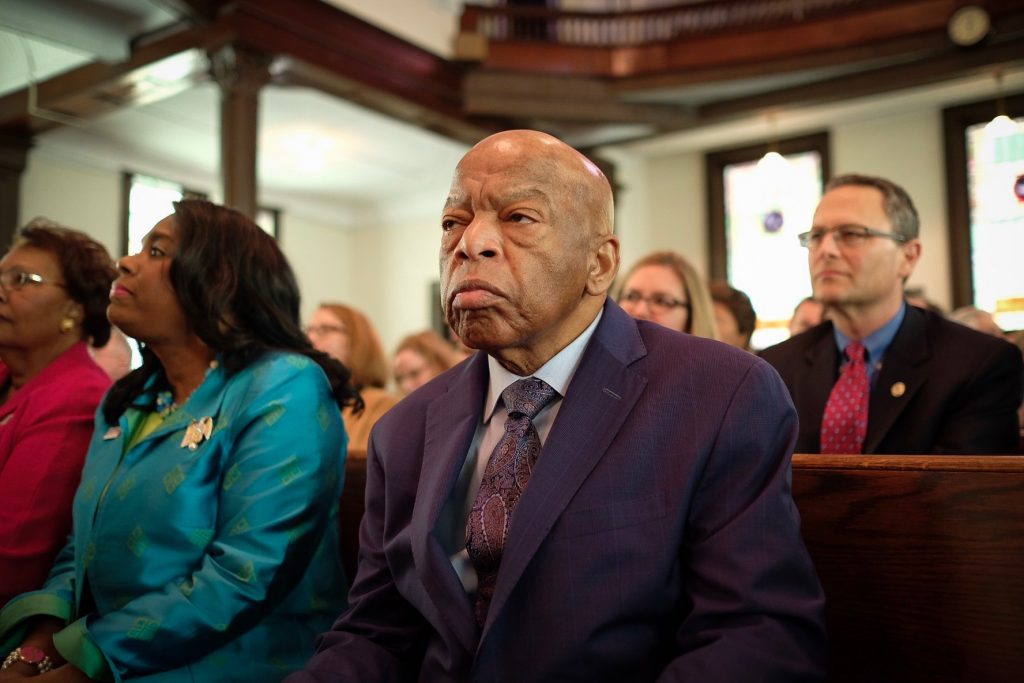July 6, 2020
by Carla Hay

Directed by Dawn Porter
Culture Representation: Taking place in various parts of the United States, the documentary “John Lewis: Good Trouble” features a racially diverse (African American, white, Latino, Asian) group of people (mostly U.S. political insiders) talking about the life and career of Georgia U.S. Representative John Lewis, including Lewis himself.
Culture Clash: Most of the documentary is about Lewis’ ongoing fight for civil rights and social justice.
Culture Audience: This movie will appeal primarily to people with politically liberal views, since Lewis’ conservative opponents and critics are not included in the documentary’s interviews.

“John Lewis: Good Trouble” (directed by Dawn Porter) is a respectful biographical documentary that puts a lot of emphasis on the important, trailblazing work that U.S. Representative John Lewis (a Democrat representing Georgia’s 5th congressional district) has done for civil rights. But in the documentary’s enthusiasm to put Lewis on a pedestal, the film shuts out any opposing opinions. Regardless of anyone’s political beliefs, there’s no doubt that Lewis (who participated in the documentary) has led an inspiring life. However, it’s ironic that a man who’s known for standing up to opponents and critics has had his current opponents and critics excluded from a biographical film of his life.
Almost everyone interviewed in the movie is part of the U.S. mainstream political establishment, a Lewis family member, or someone who works for Lewis. The only Republican interviewed in the film is U.S. Representative Jim Sensenbrenner, who’s represented Wisconsin’s 5th congressional district since 1979.
Sensenbrenner, who is a former chair of the House judiciary committee, doesn’t really say anything substantial. He essentially praises himself and Lewis for being able to work together: “I think the cooperation, which has been outstanding, between John Lewis and myself ends up being an example that we can get important things done by being bipartisan, whereas if we were not bipartisan, they never would’ve happened.
Other people interviewed in the documentary are Democratic politicians Nancy Pelosi, Bill Clinton, Hillary Clinton, Jimmy Carter, Alexandra Ocasio-Cortez, Ilhan Omar, Rashida Tlaib, James E. Clyburn, Cory Booker, Stacey Abrams, Ayanna Pressley, Sheila Jackson Lee and the late Elijah Cummings, who said he’s flattered when people mistake him for Lewis. And there are other known Democrats who are among the chorus of praise for Lewis in the movie, such as former U.S. attorney general Eric Holder, civil rights activist Bernard Lafayette Jr. and professor/historian Henry Louis Gates Jr.
Lewis’ past and present subordinates also share their thoughts, including Anthony Johnson (Lewis’ former press secretary); Michael Collins (chief of staff); Brenda Jones (communications director); Ruth Berg (former receptionist); Rachelle O’Neill (senior constituent and external affairs liaison). Lewis’ family members and close friends who are interviewed in the documentary include siblings Henry Lewis, Ethel Lewis-Tyner and Samuel Lewis; son John Miles Lewis; and Xernona Clayton, who was a close friend of John Lewis’ late wife Lillian Miles Lewis, who passed away in 2012, at the age of 73.
Clyburn (a U.S. Representative from South Carolina) says of John Lewis: “He’s probably the most courageous person I ever met.” Ocasio-Cortez (a U.S. Representative from New York) says that she wouldn’t be where she is today had it not been for the trails blazed by John Lewis and other civil-rights activists. “So much of John Lewis’ activism was to highlight the inaction of the federal government.”
Hillary Clinton has this to say about John Lewis: “His voice and his example are needed, now as much as they’ve ever been since he was a young man.” Abrams comments: “You cannot replace John Lewis. It’s a matter of strategy, someone who has cultivated a story to remind us that our past has not passed.”
It’s not surprising that John Lewis doesn’t get any criticism from any of the people interviewed for this documentary. (And if they did say anything negative about him, it didn’t make it into the film.) What saves this movie from completely one-sided banality is that it does present an excellent historical view of the obstacles and brutal struggles that John Lewis has faced to fight for the causes that he believes in and passionately advocates. The film does a very good job presenting him as someone who doesn’t give up easily. He’s got a fiery and opinionated personality, but he also has deep compassion for others.
John Lewis (who was born in 1940 in Troy, Alabama) was at the forefront of the U.S. civil rights movement that began in the 1950s and blossomed into groundbreaking laws and sweeping social change in the 1960s. In the documentary, he remembers how his parents discouraged him from getting involved because they feared for his safety. But he ignored their concerns and decided to join the movement, despite getting beaten up and arrested several times.
John Lewis has always been a proponent of peaceful protests (consistent with what Rev. Martin Luther King Jr. also advocated), and he says he was also heavily influenced by Rev. James M. Lawson Jr., who taught him how to organize and act in peaceful demonstrations. The “good trouble” in the documentary’s title refers to John Lewis’ well-known catch phrase for the kind of trouble he likes to get into: If it’s for a good and worthy cause, it’s “good trouble.”
People who know about Lewis’ civil-rights history and what he does as a U.S. Representative probably won’t learn anything new from watching this documentary, which includes lots of great archival footage of his civil-rights activities. There’s also newer footage, such as when he gave speeches at rallies for fellow Democrats who ran for government positions in the 2018 mid-term elections. Beto O’Rourke, Colin Allred, Marc Veasey, Abrams and Lizzie Fletcher are some of the politicians who received John Lewis’ enthusiastic endorsement during their campaigns.
Although “John Lewis: Good Trouble” doesn’t uncover anything new or surprising about him, it will be an eye-opening documentary for people who don’t know much about John Lewis, who is a bona fide hero to a lot of Democrats and liberal-leaning voters. Much of the film discusses the personal sacrifices he went through to fight for a greater cause. Therefore, it’s no wonder that the documentary includes a lot of footage of star-struck people greeting Lewis with joyful hugs, enthusiastic handshakes and sincere thank yous when he goes out in public. The documentary also shows his lighter side by mentioning the viral video of John Lewis dancing to Pharrell Wlliams’ “Happy” (which is one of John Lewis’ favorite songs) in 2014.
It’s apparent from watching the film that his life revolves around his work, but that doesn’t mean that John Lewis has lost his priorities in how he treats people close to him. His chief of staff Collins gets emotional and teary-eyed when he remembers that when his father died in 2006, John Lewis went to the funeral of Collins’ dad instead of being at the historical signing of the re-authorization of the Voting Rights Act, which eliminated policies designed to prevent people of color and financially disadvantaged people from voting.
In the documentary, Pelosi (a U.S. Representative from California) says that the re-authorization Voting Rights Act poor people and is one of Lewis’ biggest legacies: “One of the greatest experiences in the Congress which I treasure was working under John Lewis’ leadership and other members of the Congressional Black Caucus. We put together [the re-authorization of] the Voting Rights Act, which was passed in 2006.”
Even though the documentary has a plethora of praise from John Lewis’ current Democratic allies, the film doesn’t shy away from including details of past conflicts that John Lewis had with people fighting for the same causes. He says he was essentially removed as leader of the Student Non-Violent Coordinating Committee (SNCC) when Stokely Carmichael was elected national chairman in 1966, because the SNCC no longer agreed with John Lewis’ pacifist beliefs. The documentary also mentions the friendship-turned-bitter-rivalry between John Lewis and fellow civil-rights activist Julian Bond when they campaigned against each other in 1986 for the same Georgia congressional seat in the U.S. House of Representatives.
Carmichael died in 1998, and Bond died in 2015, but it would’ve been interesting for the documentary to include the perspectives of people who were allies of Carmichael and Bond when they were political rivals to John Lewis. The closest that the documentary comes to interviewing anyone who speaks of having political tensions with John Lewis is when Bill Clinton (who is pro-death penalty) comments that John Lewis’ anti-death penalty views helped Bill Clinton became more open-minded on the issue. Bill Clinton says of John Lewis: “He was against the death penalty as a matter of conscience.”
“John Lewis: Good Trouble” could have been a boring retrospective about a longtime politician/activist looking back on his glory days. But the documentary makes it clear that he’s still got a lot of fight in him for challenges facing the U.S. and the world today. And true to his nature, he’s not going to back down from any fights.
As he says in the opening scene of the documentary: “I feel lucky and blessed that I’m serving in the Congress, but there are forces today trying to take us back to another time and dark period. We’ve come so far, we’ve made so much progress, but as a nation and as a people, we’re not quite there yet. We have miles to go.”
Magnolia Pictures released “John Lewis: Good Trouble” in select U.S. cinemas, on digital and on VOD on July 3, 2020.
July 17, 2020 UPDATE: John Lewis died of pancreatic cancer on July 17, 2020. He was 80 years old. Lewis had publicly announced his cancer diagnosis in December 2019.
